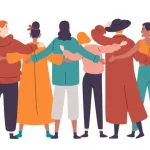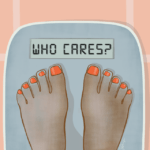If you are here to find healing from harmful diets, exercise addiction, and/or food shame and guilt, then I am sure this is not your first time trying to recover. Personally, it took me two years, nearly fifty tries, and a shit load of tears before I even BEGAN. And that is okay.
While I am at peace with the amount of time it has taken for me to move through my anxieties, fears, and sadness (although it is still work I do daily), I would love for you to find peace sooner, if possible (no pressure, though). However, I think what stops so many from finally taking the step forward and venturing down a path of recovery, is the fact that there is no one set definition and different definitions serve you at different times. This can make it hard to even begin. So, defining YOUR recovery can be a great first step.
If you are like me, and follow all those Instagram recovery blogs, dominated by thin, white women who still exist within societal ideals, you most likely already have your determined definition of recovery… or, at least the lifestyle you feel is acceptable to recover into. Yes, I am so grateful for those spaces and the women brave enough to be so vulnerable. I do think they help. However, I also think most promote an intuitive lifestyle, which is fantastic, but may not be achievable for everyone, or at least not right away. And, again, that is okay.
Obviously, I would love for everyone to reach an intuitive lifestyle, but I also want to hold space for those that may not feel supported by this or feel it is too far of a jump to make right now. The truth is: it is unrealistic to assume that recovery can look the same for everyone, and all can follow similar paths and obtain similar results. This is why it is important to define what your recovery will look like.
Personally, I define recovery as the ability to eat a satiating amount of foods, of all different varieties, without shame or guilt and engaging in joyful movement, rather than punishment. For me, it felt best to approach this goal in stages. At my lowest weight, I had lost a great deal of my physical health, not just my mental health. In my first stage of recovery, I did not delete MyFitnessPal. I tended to over-estimate calories, and for me, it felt helpful to know the amount I was consuming. Not to mention, it helped me set goals. I ate a minimum of 2,000 calories every day and paid attention to getting in enough protein and fat in hopes of restoring my hormones and stop my hair loss. I also cut out all forms of intense cardio and went to the gym no more than 3 days a week.
This phase served me for about 5-6 months. Once I got my period back, I realized it was not the quantity of food that frightened me (I learned to associate eating more with maintaining my health), but the quality of food. Over the next few months, I began introducing foods that I had previously deemed to be “bad.” This meant eating that slice of pizza or having some ice cream. And with more fuel, I began making strength goals and returning to the gym more often.
During this time, I was able to normalize my fear foods, but also recognized that I still struggled to leave portion sizes behind. I slowly began weighing food less and less. It started with my coffee, and then a food, and then a snack, and so on. And now, I feel indifferent about tracking. For the most part, I am mindful of my food intake the day before I have a big lift at the gym to ensure I have enough energy and am not placing too much stress on my body. Now, I have reached a place where food can fuel my strength goals, while simultaneously being means of enjoyment, connection, and nourishment.
I am well aware that my recovery looks vastly different from most, but it is what best supports me and what makes me feel my best. For some, recovery means stopping all forms of exercise, deleting any and all tracking apps, and eating all the foods your body craves, regardless of the time of day or what it is. This is perfectly fine. For others, recovery means slowly releasing restrictions, continuing to engage in gentle movement, and learning to rest more. This is perfectly fine. Your recovery is for you. And only you. And while all approaches take time, at the end of it all, recovery should bring you a sense of peace and ease with food and your body, no matter what the process entails.
How would you define recovery? What is one step you can take to begin?


